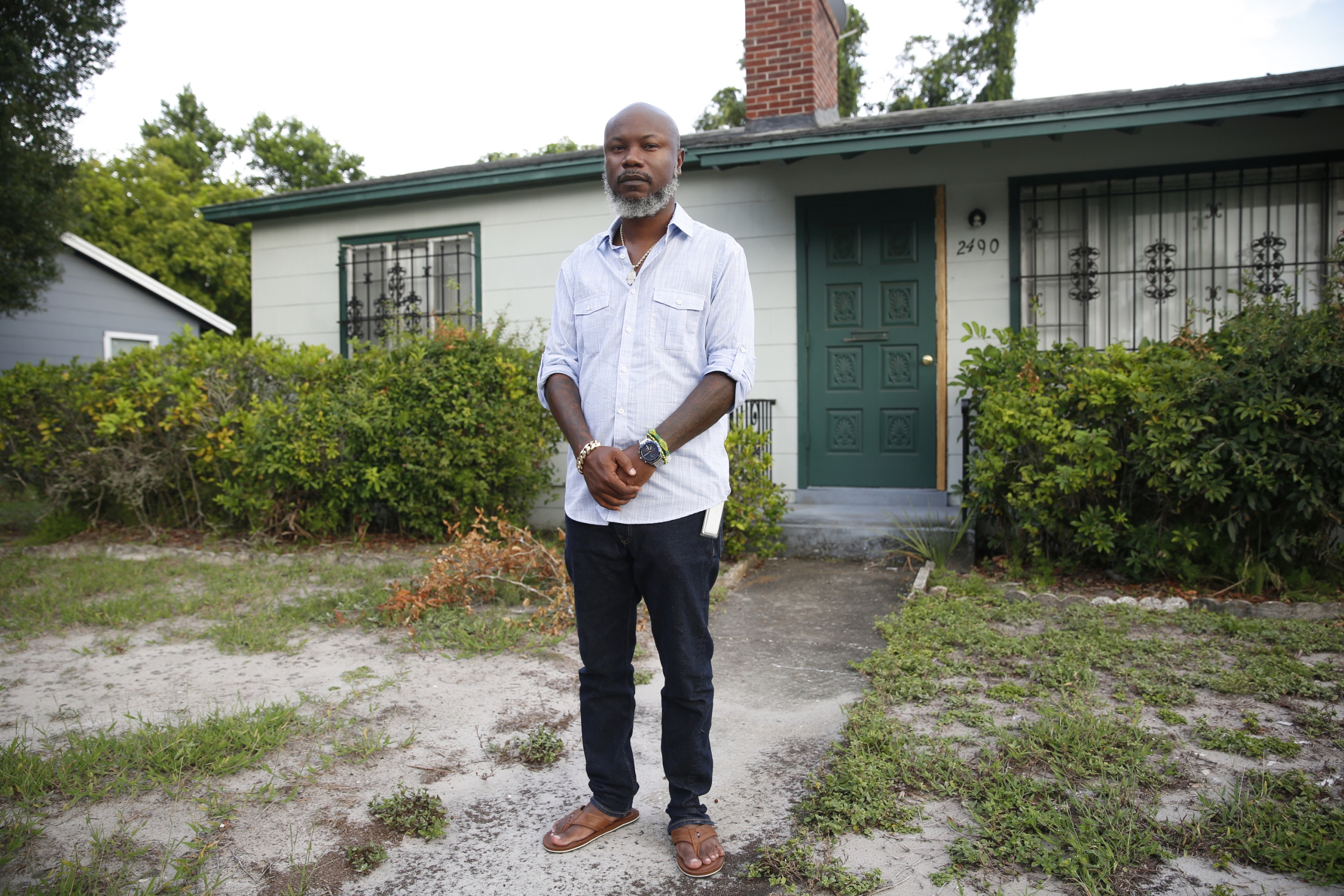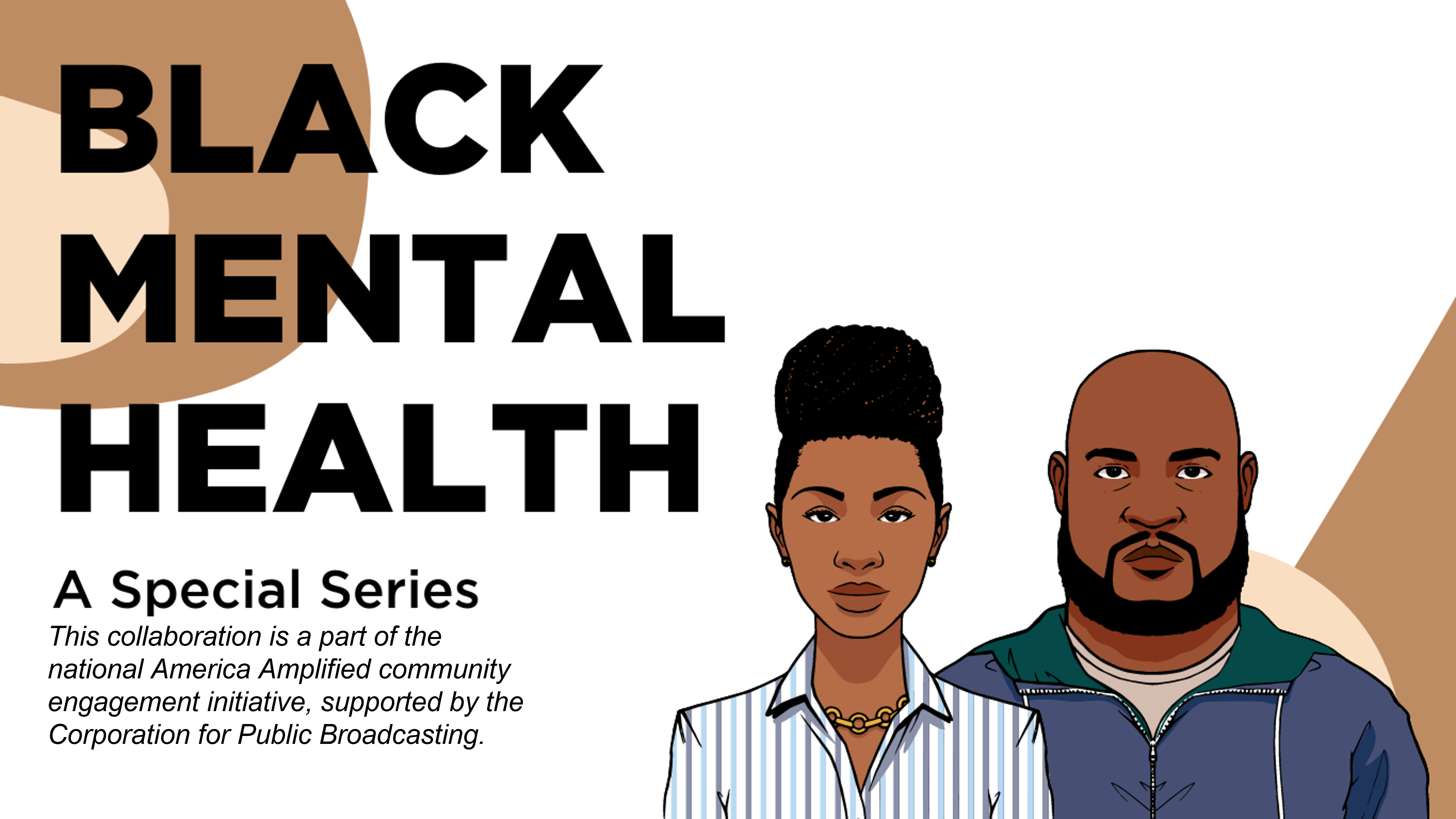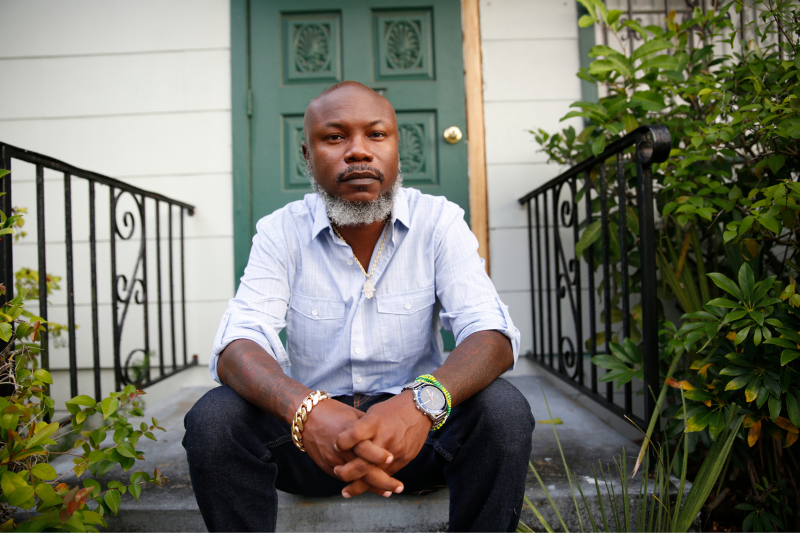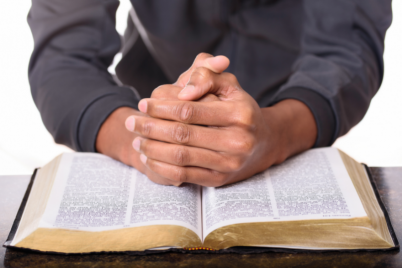Harold Bryant, 42, is the community engagement coordinator for the Foundation for Healthy St. Petersburg. He sits in front of where his grandmother used to live and where he spent most of his childhood, in the Perkins Heights neighborhood. Bryant lost his grandmother last year and has since been learning to cope without the matriarch for the entire family and who kept everyone together. Octavio Jones | WUSF Public Media
BY OCTAVIO JONES, WUSF Public Media
Editor’s note: This story is part of a local journalism collaboration about the impacts of mental health on Black Floridians and how they are facing a variety of challenges.
ST. PETERSBURG — Black Americans face a complex set of challenges as they try to maintain their mental health. On top of universal issues like depression, stigma, and economic stress, they deal with racism, health inequities, and the systemic effects of Jim Crow segregation.
That’s especially acute for Black men, who rarely talk freely about seeking mental wellness. WUSF journalist Octavio Jones spoke with two Black men living in the greater Tampa Bay region and asked them to share their lived experiences. Here is Harold Bryant’s story, in his own words.
“I guess growing up 18, being from St. Petersburg, I mean, you just basically live by the seat of your pants. You know, you’ve always been taught not to be tough, kind of deal with your problems yourself. But growing up as an adult, I see that’s not the correct way to do it.
You know, I can say a prayer; prayer does help a lot. I’m a very spiritual type of person. You know, the book of Job is pretty much where God breaks him down. And you can be at a high point and very, very high – you’ve got everything going, and he breaks you down. But in that process, you get stronger when you do the rebuild.

‘Both of my parents are deceased, and all my siblings. I’ve experienced a lot of deep and close deaths before I even turned 25,’ said Harold Bryant. Octavio Jones | WUSF Public Media
I do believe in guidance from my elders in the community as well because they know the pitfalls that kind of hinder us in an advanced state. So, it kind of makes me have questions; I’m always a question-type person.
In high school, there were the riots. (In 1996, 18-year-old TyRon Lewis was shot and killed by a St. Petersburg police officer during a traffic stop. His death led to several days of rioting and unrest, including when the officers involved were not charged with a crime). And the riots kind of took their toll on me personally.
I went to Gibbs High School but wasn’t in the regular program…I was in the PCCA (Pinellas County Center for the Arts) program, so I was in the arts magnet. So, when the riots happened, a lot of the kids that I went to school with, which were North County, north side (St. Pete), they got counseling… “Oh, you’re going into the south side; you need to prepare yourself for the riots.”
But the average student did not get that. So being, you know, homegrown in the neighborhood, they pretty much told us this, you know, “Look out for each other.” And that’s how we protected our mental health at that particular time. That’s the first time I really saw what mental health could do from the capacity of a kid.
Just a little backstory on me, both of my parents are deceased, and all my siblings. I’ve experienced a lot of deep and close deaths before I even turned 25. The most recent was when I was like 36. And I can say in that space, you definitely have to have someone to talk to because your go-to people, your core nucleus, they’re not there.
One of those persons would be my grandmother. My grandmother was, like, pretty much my therapist. She helped me get through those trying times.
About this experience, they don’t tell you about grief. They say the seven stages of grief, you go through them. But I think you go through them every day. It gets easier as time goes by, but you never forget.
It can be moments where I can listen to a song, and it – SNAP – you’re just a bucket of water, and you’re taken back to that space. It’s not really a setback; it’s just basically giving space to say, ‘You know what? I’m human.’ It happens.
Then you go to…I guess, my coping mechanism. The things that I do are I read, I pray, and then I go on about my day. I don’t like to stay stagnant in that moment.
I’m still doing it. I’m a work in progress. I’m definitely not gonna say I’ve mastered it, but I can say just overall, growing up and learning and also becoming a father…You have to learn to cope but also still be functional.
Octavio Jones is a multimedia reporter with WUSF Public Media. This story is part of a collaboration with The Florida Courier, The Weekly Challenger, RoyalTee Magazine and WUSF Public Media. It also is a part of the national America Amplified community engagement initiative, supported by the Corporation for Public Broadcasting.
Crisis resources:
- If you are or know someone in crisis, call the National Suicide Prevention Lifeline to speak with a trained crisis counselor 24/7 at 800-273-TALK (8255), or call 988
- To connect with a trained crisis counselor and receive free 24/7 crisis support through text message, text NAMI to 741-741.
- National Domestic Violence Hotline: Call 800-799-SAFE (7233)
- National Sexual Assault Hotline: Call 800-656-HOPE (4673)
Resources:
The following are resources focused on addressing mental health care for Black males:
- The Brother, You’re on My Mind toolkit from the Omega Psi Phi Fraternity provides materials to the community on depression and stress in African-American men.
- Black Men Heal is a 501c3 grassroots nonprofit organization established in 2018. It was created as a solution to a broken inequitable mental health care system that does not center the needs of marginalized Back and Brown communities.
- Therapy for Black Men is a directory of therapists and coaches across the United States providing counseling to Black men.
Black Americans face a complex set of challenges as they try to maintain their mental health. On top of universal issues like depression, stigma and economic stress, they face racism and inequities in the health care system. The Florida Courier, The Weekly Challenger, RoyalTee Magazine and WUSF Public Media created this series to highlight the stories of Black Floridians seeking emotional healing and wellness, and to provide resources for those needing support.










I have known Harold Bryant for several years. I knew his mother. I met Harold after she had passed. I could actually feel his story. I appreciate that he shared it with the Challenger. Next time I see him, I will encourage him for sharing.